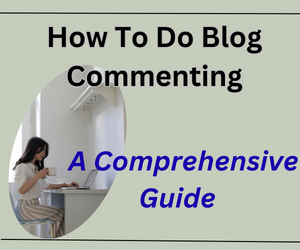Welcome to the ultimate guide on how to do blog commenting to boost your website traffic. In this comprehensive guide, We will walk you through the ins and outs of strategic blog commenting and show you how to make it a powerful tool for growing your online presence.

Understanding the Basics of Blog Commenting
Definition and Purpose
Blog commenting involves actively engaging in discussions on other blogs by leaving thoughtful comments. The primary purpose is not only to express your views but also to attract attention to your website and establish a presence in your industry.
Blog commenting isn’t just about dropping links; it’s about contributing to the discussion and adding value to the community.
The Value of Blog Commenting
Contrary to misconceptions, blog commenting goes beyond SEO. It’s about creating a dialogue, showcasing expertise, and tapping into existing communities. These elements can contribute to a robust traffic generation strategy.
While SEO benefits are undeniable, the real value of blog commenting lies in creating meaningful connections and establishing yourself as an authority in your field.
Finding the Right Blogs to Comment On
Identifying Relevance
Start by identifying blogs that align with your niche. Look for platforms where your target audience is active. Tools like Google Alerts, Feedly, or social media groups can be excellent resources.
Example: If you’re in the fitness niche, focus on commenting on blogs related to health, wellness, and exercise.
Evaluating Credibility
Not all blogs carry the same weight. Evaluate a blog’s credibility by considering factors like the author’s expertise, the blog’s popularity, and the engagement in the comment section.
A blog with a knowledgeable author and an active, engaged audience is more likely to bring valuable traffic to your site.
Crafting Engaging and Effective Comments
Anatomy of a Great Comment
Crafting a great comment involves more than just saying, “Nice post!” Dive into the content, share your thoughts, and ask questions. Make it clear you’ve read and understood the post.
Example: Instead of a generic comment, try something like, “I loved your point about [specific point from the blog post]. In my experience, I’ve found that [share personal insight or experience]. What are your thoughts on [related question]?
Tips for Standing Out
Standing out in the comment section requires a personal touch. Avoid generic comments and focus on adding value to the conversation. This is your chance to showcase your expertise and personality.
Example: Instead of a standard comment, try sharing a relevant personal anecdote or a unique perspective related to the blog post.
Building Relationships Through Blog Comments
Engaging with the Community
Blog commenting is a two-way street. Engage not only with the blog author but also with fellow commenters. Respond to their comments, ask questions, and be genuinely interested in the conversation.
Example: If someone responds to your comment, continue the conversation. Acknowledge their points, share further insights, and encourage a back-and-forth dialogue.
Leveraging for Networking
Blog commenting can open doors for collaboration and networking. When appropriate, express your interest in connecting further. This could lead to guest blogging opportunities or other collaborative ventures.
If the blog post aligns with your expertise, consider reaching out to the author directly. Express your appreciation for their content and suggest a potential collaboration or guest post.
Leveraging Keywords for SEO Benefits
Incorporating Relevant Keywords
While maintaining a natural tone, strategically incorporate relevant keywords into your comments. This can boost your comment’s visibility and contribute to your overall SEO strategy.
Example: If you’re a travel blogger commenting on a post about “best travel destinations,” naturally include phrases like “travel tips,” “adventure,” or “exploring new places” in your comment.
Balancing Optimization with Natural Language
Avoid keyword stuffing. Ensure your comments read naturally and contribute to the conversation. Google’s algorithms prioritize authentic engagement over forced keyword usage.
Example: Instead of cramming keywords, focus on using them organically. For instance, if the blog post is about “healthy recipes,” share your thoughts on a specific recipe and naturally include relevant keywords like “nutritious” or “easy-to-make.”

